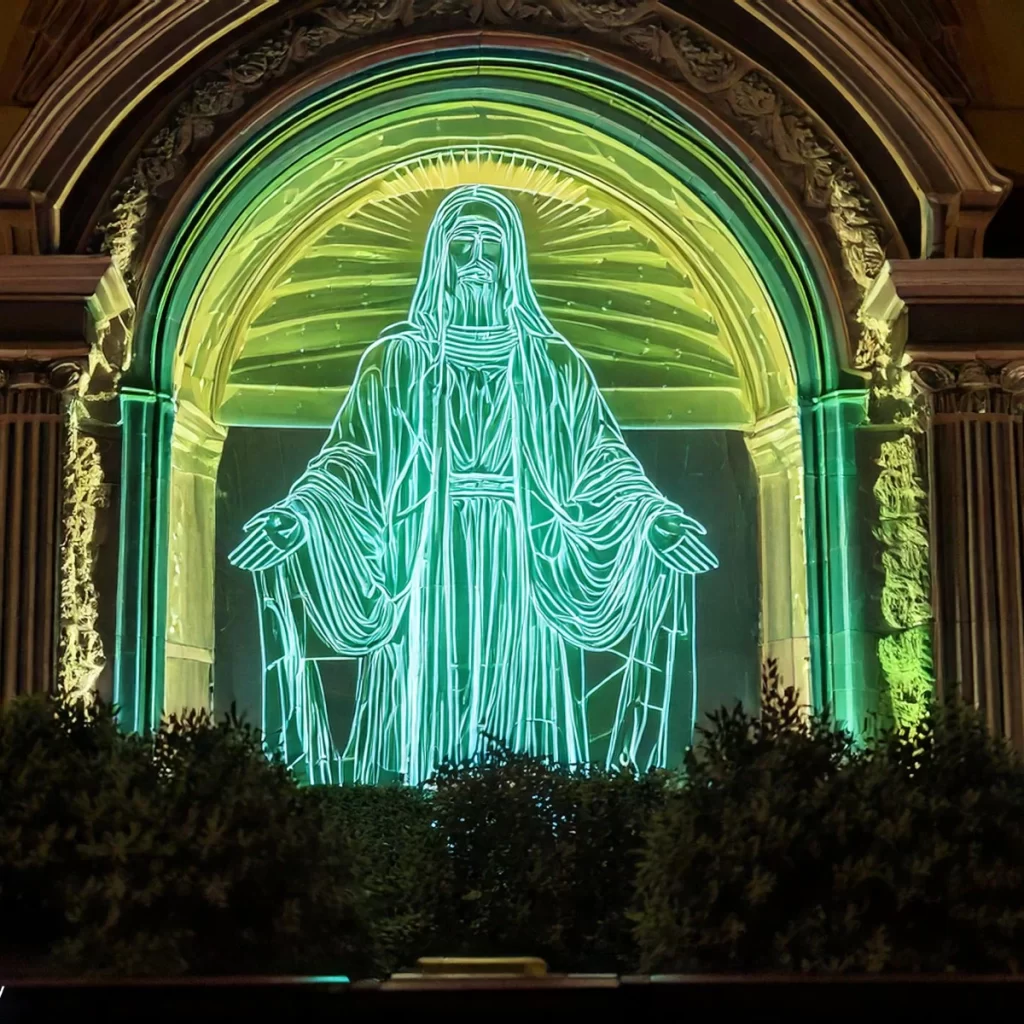What happens when faith meets the future? At St. Peter’s Chapel, the oldest church in Lucerne, Switzerland, visitors are greeted by an unexpected confessor—a holographic representation of Jesus Christ powered by artificial intelligence. This groundbreaking art installation, Deus in Machina, is sparking conversations about the opportunities and challenges of integrating AI into deeply personal and spiritual experiences.
Here’s a closer look at this thought-provoking project
An Innovative Confessional Experience
Imagine stepping into a confessional booth, not to meet a priest, but to encounter a glowing, life-size hologram of Jesus Christ. The hologram warmly greets you with, “Peace be with you, brother,” and invites you to share whatever is weighing on your heart. Developed by the Immersive Realities Research Lab at Hochschule Luzern (HSLU) in collaboration with theologian Marco Schmid, this installation is far more than a technological gimmick—it’s a bold experiment in exploring how artificial intelligence can engage with the human spirit.
The project team deliberately chose a confessional setting to encourage intimate and meaningful conversations. Although the interactions aren’t recognized as formal religious confessions, they serve as a platform for reflection and dialogue. The hologram is programmed to respond using insights from sacred scripture and theological texts, and so far, its responses have aligned with the teachings of St. Peter’s Chapel.
But is this truly a step forward in spiritual care—or just a provocative use of technology?
The Purpose Behind Deus in Machina
The title Deus in Machina translates to “God in the Machine,” hinting at divine omniscience while also raising questions about humanity’s reliance on algorithms. According to Schmid, the installation was designed to provoke curiosity and critical thinking, especially among individuals who may not regularly engage with religion. By blending centuries-old tradition with cutting-edge technology, Deus in Machina challenges visitors to consider the evolving role of AI in personal and spiritual spaces.
“The installation encourages moments of intimacy and reflection,” Schmid explains. “It’s not about replacing traditional practices but sparking dialogue about where technology fits into our lives—especially in matters of faith.”
A Conversation Starter, Not a Substitute
While Deus in Machina offers a unique opportunity to interact with AI on a spiritual level, it’s important to note that these conversations are not considered sacramental confessions. The holographic Jesus may appear lifelike, but it is still governed by algorithms and programming. The creators have carefully trained the AI using theological materials, yet they acknowledge the inherent risks of relying on AI for spiritual guidance.
The installation’s primary goal is to inspire participants to think critically about the implications of AI’s expanding presence. Does technology enhance our connection to spirituality, or does it risk diluting sacred traditions? These are the questions Deus in Machina seeks to explore.
Praise, Criticism, and Everything in Between
As expected, this experimental initiative has generated a wide range of reactions. Some view it as a bold and creative way to make faith more accessible, while others see it as controversial or even blasphemous. Social media platforms have been abuzz with debates, from humorous quips like “Father, forgive them for they have glitched,” to serious concerns about whether this aligns with religious teachings.
Critics argue that placing AI in a confessional diminishes the sanctity of the space, while supporters appreciate its effort to engage a modern audience. Regardless of the opinions, one thing is certain: Deus in Machina has succeeded in sparking dialogue about the role of technology in human connection.
What’s Next for Deus in Machina?
The installation is set to conclude with a public presentation and discussion on November 27. This event will provide insights into the project’s outcomes, as well as broader reflections on the ethical and theological implications of AI in spiritual contexts.
As the world continues to explore the intersection of technology and tradition, Deus in Machina serves as a timely reminder to consider the opportunities—and limits—of AI in deeply personal spaces. Whether you see it as innovative or irreverent, this AI-powered confessor is undeniably a glimpse into the future of faith.

